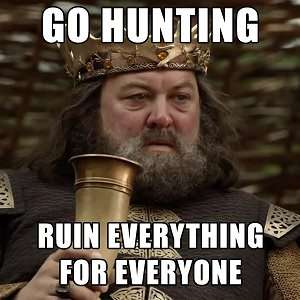Piracy Not Really Hurting Game of Thrones, Most Pirated TV Show of 2012, Says Director
But copyright law killed Carnivale

The HBO show Game of Thrones was the most pirated television show of 2012, according to TorrentFreak, which explains most of the downloads (up to 4.28 million per episode) happened overseas, where access to the premium cable channel and the show is limited. By TorrentFreak's account, the show is a particularly popular download in Australia. The subject came up in a panel down under featuring the show's director. Via the Sydney Morning Herald:
Panel mediator Rosemary Neill noted Game of Thrones was the most pirated show of 2012 and that 10 per cent of the downloads came from Australia.
But [the director David] Petrarca shrugged and said the illegal downloads did not matter because such shows thrived on "cultural buzz" and capitalised on the social commentary they generated.
"That's how they survive," he told the crowd gathered at the University of Western Australia.
Network executives don't share the sentiment. Piracy of television shows is apparently growing faster than music and even movies, and some executives are looking to mimic the campaign waged against piracy over the last decade by the record industry. But despite the RIAA's contention otherwise, illegal downloads can actually fuel sales. One 2009 study showed people who downloaded music for free (legally or otherwise) were ten times more likely to pay for music and another study showed albums leaked online before their release enjoyed a (minor) sales benefit from that extra availability. Even the Wall Street Journal has explored the added value of piracy to the music business.
The creator of the long ago cancelled HBO show Carnivale, meanwhile, bemoaned the way copyright works in the television/film business. In an interview last week with the AV Club about how Carnivale would've finished (had HBO let him do something, anything, with the ideas to which they bought the copyright), Daniel Knauf explained:
But one of the things that makes me a little crazy about Hollywood is, they're idiots when it comes to their contractual stuff. If I write a novel, it's like Random House publishes the novel, copyrights it, but when you do business in Hollywood, they say, "Everything in this thing, in all forms, in all potential forms invented and uninvented…" The language is draconian! "…throughout the universe. We own everything in your head. We own everything." And it's like, "If you own everything, at least exploit those rights, please. Could you please exploit the rights? And if you're not going to exploit the rights, can I at least have them back, so I can exploit them?" It's just a silly way of doing business. They do it because they can, and that's all.
Let's say I take a new-project idea to Sony, and they give me that language. I go, "You know, this whole copyright-influential-property thing, I'm not so hot on that. I'll take less money if I can retain the copyright or the ancillary rights," they'd say, "Take a fucking hike." If I go, "Well then, I'll take a hike. I'm going to go to Warner Bros." And Warner Bros. has the exact same contractual language. It's basically an illegal trust. It's like the mob. Artists are first to give up intellectual rights to do business with Hollywood. But they're not rights you give up in any other medium. It's BS.
Check out Reason TV's Q&A with Jerry Brito on why copyright law is so Mickey Mouse in the first place:
h/t Mark Sletten


Show Comments (179)